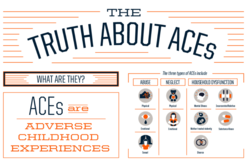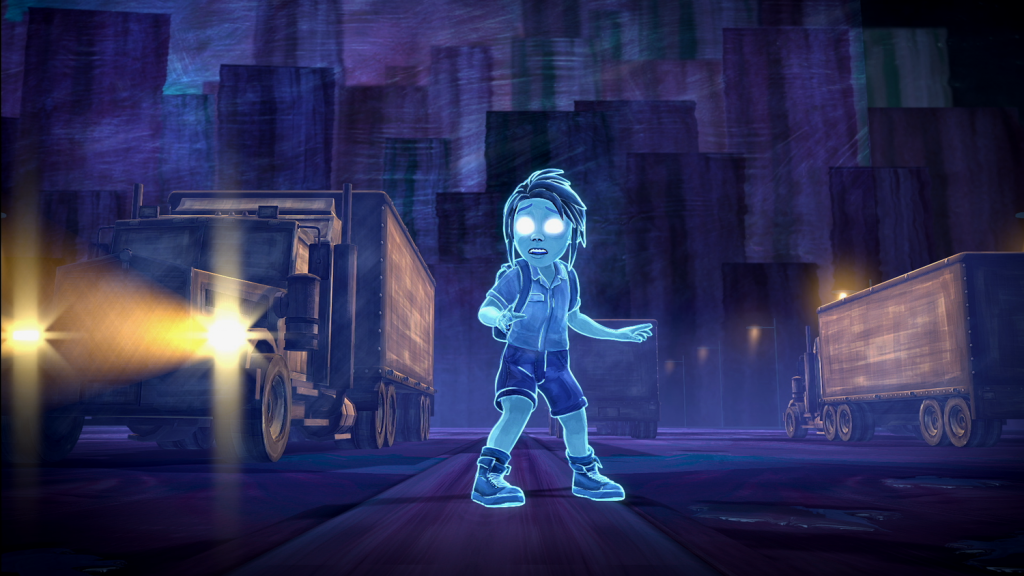Our film series examining this year’s University Theme, Resilience, is underway, and our first film, Resilience: The Biology of Stress and the Science of Hope, is one that shows just how devastating and long-term emotional trauma can be. Tuesday night in Miller Auditorium, our panel of experts, Prof. Ruth Charles (WSU Social Work), Kyann Brown (Winona Health), and Angela McQuinn (Winona Area Public Schools), helped us all to understand how trauma experienced in childhood impacts people’s lives, not just emotionally but also physically, for decades following.
Produced by KPJR Films, James Redford’s documentary begins with the research of clinical physician Dr. Vincent Felitti and Center for Disease Control epidemiologist Robert Anda into what they called “Adverse Childhood Experiences” or ACEs. In Resilience and its “twin” or “sister” documentary, Paper Tigers (both available from Krueger Library), Redford explains Felitti and Anda’s research and how it impacts the practices of a number of medical, educational, and social-work professionals.

Director James Redford with his father Robert Redford
Resilience has two main goals. The first is to show how adverse childhood experiences from toxic home environments have tangible effects on both short- and long-term health. The second–and perhaps more crucial to our year-long theme–is to demonstrate the remarkable resilience required not only by those affected by ACEs but also by those professionals in medical, social work, and educational fields who are working to counteract the prevalence of ACEs and their impact.

A brief introduction to “ACE”
Redford and writer Jen Bradwell take a straightforward approach in documenting this content, with an expository style dominating the film’s running time. Like many documentaries, real-world people describe their work and how they advocate for children’s wellness. As social actors, they deliver information and their actions for the good of children create empathy. With such a heavy and important topic as how toxic stress effects children, it’s impossible not to be moved by their work.

Dr. Nadine Burke Harris leads the way for Youth Wellness
One of the most impactful of the interviewees is Dr. Nadine Burke Harris, CEO of the Center for Youth Wellness. Dr. Harris is a calming and influential presence in the film, acting as a bridge between the medical and child educational fields. Teachers in New Haven, CT are shown changing methods in dealing with emotional well being for children, and finding healthy ways for them to release their stress and/or acknowledge issues at home.
The film does more than present just a series of “talking-heads” interviews, however. Its beautifully-rendered animation sequences illustrate toxic stress situations children find themselves in and require resilience to combat. These stand in for the kinds of traumatic experiences children suffer too often but cannot be captured on camera for a variety of reasons.

Creative animation highlights sequence explaining toxic stress
Resilience concludes with a conference between professionals in the medical, social work, and educational fields who have realized in their developing research the importance that their collaboration has in creating better living environments for children and decreasing risk for cancer, heart disease, and high blood pressure. Dr. Burke is shown accepting an award for her work and speaks about the importance of what they’ve done before and will continue to develop.
This ending speaks to the audience as a call to action to help in ways that they can. Awareness, participation, donations, advocacy, and action are important to the well being of children. Documentaries like Resilience inform their audience on the issues, resonating with those who wish to get involved in demonstrative change.
Again, thanks to our panelists Ruth Schroeder, Kyann Brown, and Angela McQuinn for their informed and passionate responses about their work and the resonant messages in the film. Thanks too for our strong turnout of attentive and receptive audience members who provided excellent questions and comments, helping to make the screening was a success. We look forward to more, beginning with the 2017 Academy Award Winner for Best Picture, Moonlight, Tuesday, Oct. 9 at 7 pm in Miller Auditorium. The film is rated R; the screening is free and open to the public. Barry Jenkins’ coming-of-age drama is not only one of the richest cinematic experiences any of us are likely to witness; it’s also a film that speaks directly to the theme of resilience and the challenge of overcoming adverse childhood experiences.
- For more information, check out the KPJR Films website with information on Resilience and Paper Tigers.
- Both films are available from WSU Krueger Library.
- You can also fill out this form and find out your ACE score.
- On the WSU campus, you can contact Health & Wellness Services: 507.457.5160 and Counseling & Wellness: 507.457.5330.
Also Winona Health Occupational Therapy 507.457.4329.

Trackbacks/Pingbacks